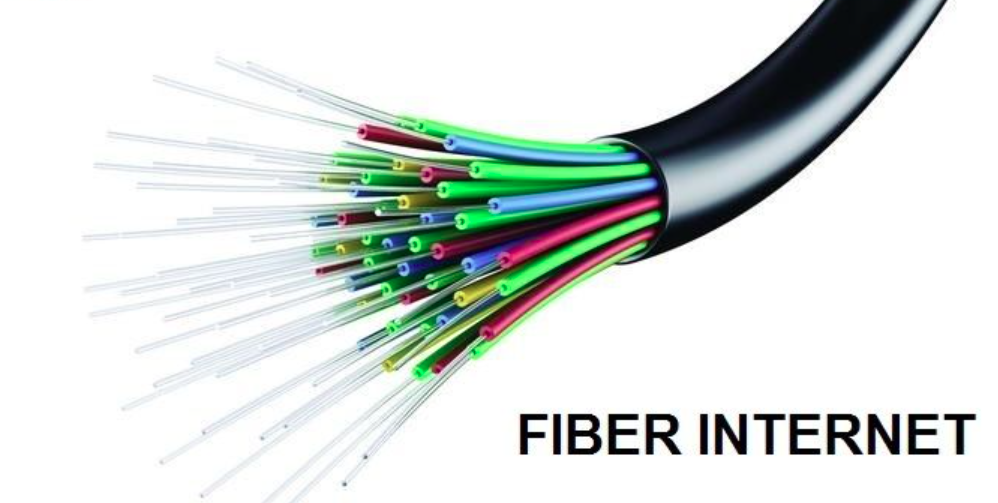Power of Fiber Internet: A Comprehensive Guide
In today’s fast-paced digital landscape, having a reliable and high-speed internet connection is no longer a luxury but a necessity. Enter fiber internet, a game-changer that’s transforming the way we connect and communicate online. In this comprehensive guide, we’ll explore the numerous benefits of fiber internet and why it’s becoming the preferred choice for both residential and business users.
Blazing Fast Speeds
When it comes to internet speed, fiber optics reign supreme. Fiber internet operates at the speed of light, literally. This means data travels through thin strands of glass or plastic fibers at an astonishing pace. The result? Lightning-fast download and upload speeds that leave traditional connections in the dust.
Understanding Fiber Optic Speeds
Fiber optic technology leverages the power of light to transmit data. Unlike traditional copper cables that use electrical signals, fiber optics can carry a significantly larger amount of data in less time. This results in download speeds that can reach up to 1 gigabit per second (Gbps) or even more, depending on your plan and provider.
Real-World Speed Comparisons
To put this in perspective, downloading large files, streaming 4K videos, and online gaming become seamless experiences with fiber internet. In contrast, cable or DSL connections struggle to keep up, leading to frustrating lags and buffering. Fiber internet ensures that you get the speed you pay for, consistently.
How Speed Enhances Your Online Experience
Fiber internet doesn’t just offer speed; it unlocks a world of possibilities. Whether you’re binge-watching your favorite series, hosting video conferences, or running an online business, fiber’s speed ensures that you can do it all without interruptions. Say goodbye to buffering and hello to uninterrupted online bliss.

Reliability and Consistency
In the digital age, reliability is paramount. Fiber internet shines in this department, offering a level of consistency and dependability that other connection types struggle to match.
Fiber vs. Traditional Copper Cables
One of the key factors contributing to fiber’s reliability is its resistance to interference. Traditional copper cables can suffer from electromagnetic interference, which can lead to signal degradation and slower speeds, especially over long distances. Fiber optics, on the other hand, are immune to these issues, ensuring a stable connection regardless of external factors.
Weather and Environmental Factors
Weather can be a significant disruptor of internet services. Rain, snow, or even extreme heat can affect the performance of traditional connections. Fiber internet is exceptionally robust in adverse weather conditions. Its durability and resistance to environmental factors make it a top choice for areas prone to extreme weather.
Implications for Online Gaming and Streaming
For avid gamers and streaming enthusiasts, a reliable and consistent connection is non-negotiable. Fiber internet’s stability means reduced latency and fewer interruptions during online gaming sessions or while streaming high-definition content. Say goodbye to frustrating lag spikes and buffering screens.
Low Latency and Reduced Buffering
Latency, often referred to as “ping,” is the time it takes for data to travel from your device to a server and back. Low latency is critical for online activities like gaming, video conferencing, and live streaming.
What is Latency?
Latency is measured in milliseconds (ms), and lower values indicate less delay. Fiber internet excels in this regard, offering incredibly low latency compared to other connection types. With fiber, you can achieve latency as low as 1 ms, providing a virtually lag-free experience.
Fiber’s Role in Minimizing Latency
Fiber’s low latency is a result of its high-speed data transmission and immunity to interference. When you click a button or make a move in a game, the data travels almost instantaneously, making your online activities more responsive and enjoyable.
Buffering: A Thing of the Past
Buffering is the bane of internet users everywhere, causing frustration during video streaming. Fiber internet eliminates this issue, as its high bandwidth and low latency ensure that data flows seamlessly from the source to your device. Enjoy uninterrupted streaming without the dreaded buffering wheel.
Unlimited Bandwidth
In an era of data-hungry applications, streaming, and online gaming, bandwidth limitations can be a major hindrance. Fiber internet, however, liberates you from worrying about data caps and limited bandwidth.
The Myth of Data Caps
Many traditional internet plans impose data caps, limiting the amount of data you can use each month. This can lead to overage charges or reduced speeds once you exceed the cap. Fiber internet plans typically come with generous or even unlimited data allowances, ensuring you can use the internet as much as you want without penalties.
Streaming, Gaming, and Smart Homes
The demand for data-intensive activities like streaming 4K videos, online gaming, and managing smart home devices is on the rise. Fiber internet’s abundant bandwidth effortlessly accommodates these activities, providing a seamless experience for all your connected devices.
Future-Proofing Your Internet Needs
As technology continues to advance, our reliance on high-speed internet only grows. Fiber internet not only meets current demands but also future-proofs your connectivity. With fiber, you’re ready to embrace emerging technologies and applications without worrying about bandwidth limitations.
Enhanced Security
In an increasingly digital world, online security is paramount. Fiber internet comes with inherent security benefits that can protect your data and devices.
Inherent Security Benefits
Fiber optic cables are difficult to tap into without detection. This inherent security feature makes it challenging for cybercriminals to intercept your data, enhancing your online privacy and security.
Protecting Sensitive Data
Whether you’re conducting business transactions, sharing sensitive information, or simply browsing the web, the security provided by fiber internet ensures that your data remains confidential and protected from potential threats.
Cybersecurity in the Fiber Age
Fiber internet providers often include advanced cybersecurity features to safeguard your connection further. These can include firewalls, intrusion detection systems, and antivirus software, adding an extra layer of protection to your online activities.
Scalability for Businesses
Businesses, in particular, stand to gain significantly from adopting fiber internet due to its scalability and reliability.
Meeting the Demands of Modern Businesses
In an era of remote work and digital operations, businesses require a robust and dependable Internet connection. Fiber internet’s high speeds and low latency facilitate seamless communication, collaboration, and data transfer, supporting the needs of modern enterprises.
Fiber Internet and Cloud Services
Many businesses rely on cloud-based applications and services. Fiber internet’s fast upload speeds make it ideal for uploading and accessing data in the cloud, enhancing productivity and efficiency.
Boosting Productivity and Connectivity
A business with fiber internet can connect more devices, run data-heavy applications, and support remote work effortlessly. This not only boosts productivity but also allows for greater connectivity between team members, clients, and partners.
Frequently Asked Questions (FAQs)
1. What is Fiber Internet, and how does it work?
Fiber internet uses thin strands of glass or plastic fibers to transmit data via light signals. This technology allows for incredibly fast and reliable internet connections.
2. Is Fiber Internet available everywhere?
While fiber internet availability varies by location, it’s increasingly expanding to urban and suburban areas. Check with local providers to see if it’s available in your area.
3. How does Fiber Internet compare to Cable and DSL?
Fiber internet outperforms cable and DSL in terms of speed, reliability, and bandwidth. It’s the preferred choice for those seeking the best online experience.
4. What speed can I expect with Fiber Internet?
Fiber internet speeds can range from 100 Mbps to 1 Gbps or more, depending on your plan and provider.
5. Are there any downsides to Fiber Internet?
While fiber internet offers numerous benefits, it may not be available in all areas. Additionally, installation costs can be higher than other types of connections.
6. Can I install Fiber Internet in my existing home?
In many cases, yes. Fiber internet providers can install the necessary infrastructure, although it may require drilling or other installation work.
7. Is Fiber Internet only for businesses, or can residential users benefit too?
Both residential and business users can benefit from fiber internet. Its high speed, reliability, and low latency enhance online experiences for all.
8. What about the cost of Fiber Internet? Is it affordable?
Pricing varies by provider and location. While fiber internet may have a higher upfront cost, the benefits often outweigh the expense in terms of speed and reliability.
9. Is Fiber Internet more secure than other types of connections?
Fiber internet offers enhanced security due to its resistance to interception. However, users should still implement cybersecurity best practices.
10. Can Fiber Internet handle multiple devices and streaming simultaneously?
Yes, fiber internet’s high bandwidth and low latency make it ideal for households or businesses with numerous devices and simultaneous streaming needs.




